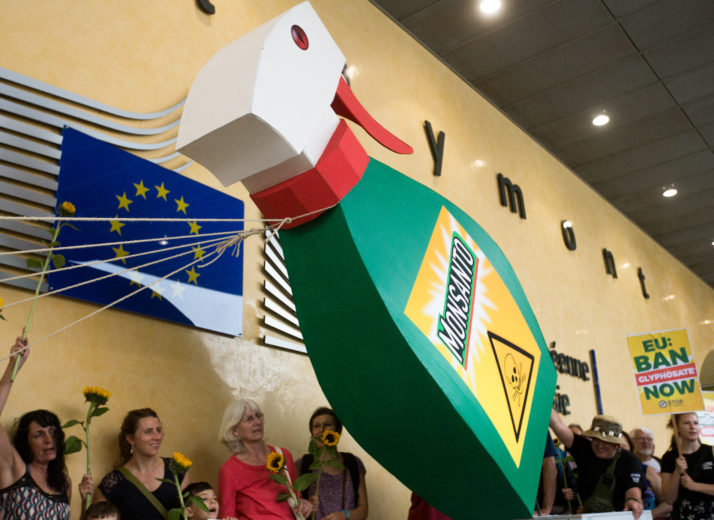Analysis
Monsanto wins as E.U. approves cancer-causing glyphosate
Germany flipped and voted with 17 other countries to extend the authorization of the use of the herbicide glyphosate, which the WHO classifies as a carcinogen.

In a shocking turn of events, the European Union has authorized the use of glyphosate for another five years, extending its license just as the European Commission and the agro-chemical lobby wanted. That was the outcome of Monday’s vote in the appeals committee in Brussels.
Eighteen countries voted in favor of the Commission’s proposal, nine voted against (including France, Italy, Austria, Belgium, Luxembourg) and one abstained (Portugal). Germany voted in favor of the proposal Monday, tipping the scales toward the renewal of the license, while it had abstained during the previous votes.
Germany changed its position after a vague reference to “respecting biodiversity” was inserted in the text of the decision to renew.
With this, Germany, together with Britain, the Netherlands, Spain and Denmark, have chosen to side with industry and against public health.
This comes as a consequence of the merger between Monsanto and Bayer, the German giant. (And probably also of the failure of the negotiations between Angela Merkel’s CDU and die Grünen for the formation of the new government.) Environmental organizations called it a scandal.
It is “the victory of business against science,” said MEP José Bové.
France, defeated, vowed to continue the fight on its own: “Today’s vote is of little importance,” said the undersecretary of the French Ministry of Ecology, Brune Poirson. “France is determined to end its use of this substance in less than five years.”
For Luxembourg as well, despite the outcome of the vote, “the struggle continues.” European Parliament intends to call an investigative commission in order to have access to the scientific studies on glyphosate.
After two years of controversy, this ends the tug of war around this pesticide produced by Monsanto, which the World Health Organization considers a carcinogen but which the E.U.’s experts have been promoting, based on studies that turned out to be merely copy-pasted from documents produced by Monsanto itself.
The copy-paste scandal broke out at the European Parliament in October, during the expert hearings, thanks to the revelations made public a month before by the Austrian NGO Global 2000.
In late October, in the wake of a citizen’s petition against glyphosate with more than a million signatures, the European Parliament passed a (non-binding) resolution that asked the Commission to “take the necessary measures for the progressive elimination of the active substance glyphosate from the European Union by 15 December 2022 at the latest, and to ensure that the use of glyphosate will be banned after this date.”
The five-year deferral that the Parliament had agreed to grant for glyphosate would have served to deplete the stocks of this product and to give intensive agriculture enough time to find other solutions.
With this vote, the 28 member countries have said no to this request by the European Parliament.
Now glyphosate is authorized for the next five years, and in 2022 the tug of war to try to ban the pesticide will start again. So, if in 2022 there’s a vote in favor of banning this active substance, it will take another five years to deplete the existing stocks. The lobbies have gotten what they wanted: 10 more years of unrestricted use.
At first, the Commission had proposed to renew the license for no less than 15 years, but then, under pressure from France and Italy, agreed to a term of 10 years, and finally just five. But for all intents and purposes, the result is what Monsanto wanted.
The European Commission said Monday that it was “happy” and “relieved” by the outcome of the vote, by which Brussels avoided having to make a difficult decision. If the vote had been negative as before (the 28 members were voting for the eighth time), the Commission would have had to decide by itself, either way enacting a choice against the will of some of its members.
It also had the option of not deciding anything, letting the existing license expire on Dec. 15 (which would have meant the product would have to be eliminated within 18 months).
But in that case, the throngs of lawyers employed by the 24 agro-chemical businesses marketing this pesticide were ready to sue the European Union, threatening the E.U. with a penalty that could reach €15 billion.
Originally published at https://ilmanifesto.it/glifosato-licenza-rinnovata-per-5-anni-e-la-vittoria-delle-lobby/ on 2017-11-28
